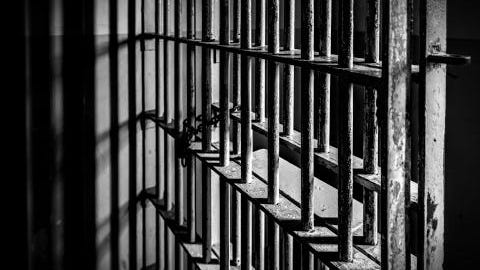An inmate in Tennessee gave birth alone in her cell this week after requests to be taken to the hospital were denied by jail staff. Despite alerting staff on the medical pod in which she was being held that she was experiencing contractions and needed to go to the hospital, jail staff kept the inmate in her cell intermittently checking her condition for an hour until she gave birth.
According to the Montgomery County Sheriff’s Office news release posted on Facebook, the inmate alerted a deputy about her contractions at 11:31 a.m. Sunday morning. The deputy relayed the issue to a licensed practical nurse who did an initial assessment on the inmate. After a consultation with medical staff, the case was handed over to a registered nurse who did an additional assessment and ordered more tests. At 12:41 p.m., a deputy summoned to the inmate’s cell discovered she had delivered her baby alone. The mother and baby were transported to the hospital by EMS and were reported to be in stable condition as of Tuesday night.
The sheriff’s office conducted an internal review of the incident, but the reason why the inmate was left alone in her jail cell while in labor and not taken to the hospital instead has not been disclosed, nor is it known whether jail staff will face discipline for this incident.
The population of women being incarcerated in America’s state prisons grew 834 percent in the last 40 years, double the rate of men in that period. And while initiatives over the last decade, including measures taken during the first years of the COVID-19 pandemic, have reduced the number of men in prisons and jails nationwide, women are being decarcerated at a much lower rate.
According to the Prison Policy Initiative there were 1.9 million people incarcerated in the United States in 2023, a decline from the peak of around 2.3 million in 2009. Of those currently locked up, 173,000 are women, this includes 76,000 in jails, the majority of whom have not been convicted of a crime.
According to the Pregnancy in Prison Statistics (PIPS) Project, an estimated 58,000 pregnant women are jailed every year. Of those, between 5-8 percent enter the penal system pregnant. Thousands of babies every year are born in a system ill equipped to respond to the needs of pregnant and postpartum mothers and their infants.
Mandatory reproductive healthcare for incarcerated women in the United States only began in 1976 with the Supreme Court decision in Estelle v. Gamble which established that prisoners have a constitutional right to receive adequate healthcare including reproductive healthcare. Still, the quality of healthcare continues to vary significantly by jurisdiction, ranging from abysmal to nonexistent, as evidenced by number of cruel deaths of inmates suffering mental health crises reported by the WSWS earlier this year.
In an effort to address the lack of guidance for treatment of incarcerated women the United Nations Rules for the Treatment of Women Prisoners and Non-custodial Measures for Women Offenders (‘the Bangkok Rules’) were adopted in 2010.
As women are largely jailed for non-violent crimes, the Bangkok Rules propose alternative punishments for pregnant women such as the exemption, deferral, or substitution of sentences and non-custodial sanctions such as house arrest and electronic monitoring rather than jail time for pregnant women and mothers of young children.
However, only eleven countries have adopted these more humane consequences for pregnant offenders. For example, in Ukraine, pregnant women serving up to five years in prison can be discharged on probation until their child is seven years old. Georgia will suspend a sentence until the child reaches one year old at which point the prison sentence can be exempted or commuted. In Armenia, jail time is not given to women or caretakers with children under the age of eight years old.
In 2021, Minnesota became the first state in the United States to allow pregnant and postpartum women into community-based release programs. But it remains the exception as evidenced by recent cases of women giving birth alone in their jail cells.
In 2017, an inmate in Kentucky begged for help from jail staff before giving birth alone in her jail cell. In Colorado, a woman’s agonized screams went unanswered as she labored in the delivery of her son in 2018. A woman in Maryland cried for help for six hours while nurses on staff at the jail ignored her in 2021.
Despite being the wealthiest country in history and despite its leadership in the field of medicine, the US has the highest maternal mortality rate of any of the wealthy western countries. As reported by the WSWS, maternal mortality rates rose 40 percent in 2021 and have risen steadily since 2000 while rates have dropped in most other western countries. It should come as no surprise, then, that the US prison system proves indifferent to the lives of pregnant women and their infants.
Once a child is born in prison, the infant is taken from its mother and is placed with family or enters the foster care system. Prison nurseries, where the baby can remain in prison with its mother do exist but are rare. The American Psychological Society has found that the bond that forms between a mother and her infant is foundational to the emotional stability of the child.
Additionally, a report published last year by the Washington University School of Medicine revealed that brain development of infants born of mothers who lived in poverty is negatively impacted. The report states, “Poverty and crime can have devastating effects on a child’s health…some environmental factors influence the structure and function of young brains even before babies make their entrances into the world.”
The correlation of incarceration rates in general and poverty are undeniable. The health of the women giving birth in their prison cells alone would have fared little better outside of jail except they might have got themselves to a hospital at the first signs of labor. But the lack of adequate or any insurance prevents many working class women from seeking appropriate prenatal or postpartum care.
As we wrote: “The effect of the income divide is exacerbated by the reactionary social policies of state and federal governments. Medicaid, the joint federal-state program providing health insurance for low-income families, drops expanded coverage for pregnant women 60 days after they give birth, although doctors advocate a much longer period of additional care and monitoring.”
As the crisis of capitalism intensifies, the indifference of the ruling elite for the lives of the working class and toilers will only increase as evidenced by the complete collapse of the public health policy with the spread of the COVID-19 and the complete denial by the Biden administration that the pandemic still rages as school resumes and children are sent back into classrooms without any mitigation from the virus.
Recent remarks from Dr. Anthony Fauci revealed the intentions of the ruling elites with regards to the plights of the poor, sick, and elderly when he said that older people, the ill and disabled “will fall by the wayside” in the current surge of COVID-19.
Only the mobilization of the working class, independent of the capitalist political parties and the union bureaucracies will fight and win the right to high quality healthcare for everyone, not just those who can afford it.
This post was originally published on this site be sure to check out more of their content.














